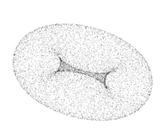The Wrapper
We talk about business as an arena, a competitive space where ideas clash, fortunes are made and lost, and human ingenuity is put to the test. For a long time, I've thought of it as something more: a kind of wrapper. A surprisingly decent, if imperfect, container around humanity's more primal, destructive urges.
For millennia, competition for resources, land, power, and status often played out on literal battlefields. The prize was dominion, the currency was blood. Then, gradually, another form of competition took greater hold: commerce, trade, entrepreneurship. The ambition to conquer was channeled, in part, into the ambition to build, to innovate, to capture market share. Instead of armies, we deployed strategies. Instead of sieges, we launched products.
This "wrapper" of business created economic interdependencies that made war more costly. It offered paths to prosperity that, for many, were more attractive than conquest. It provided a vast, dynamic arena where human energy could be spent in (mostly) non-lethal rivalry. The wrapper, while sometimes exploitative and ruthless in its own way, largely kept the swords in their sheaths, or at least directed them at balance sheets rather than battalions.
But what happens when that wrapper starts to fray?
I’ve been thinking that in what many call "late-stage capitalism," something fundamental is shifting. The arena feels different. Genuine entrepreneurship, the kind that allows an average person with a good idea and relentless drive to build something (anything!) meaningful, seems increasingly difficult. The barriers to entry are higher. The playing field is tilted by towering monopolies, by crushing capital requirements, by regulatory mazes that only the established giants can navigate with ease.
When this happens, when the pathways to genuine opportunity begin to narrow for vast swathes of the population, the wrapper weakens. If starting a business, creating value, and achieving self-sufficiency becomes a pipedream reserved for the already privileged or the exceptionally lucky, what then?
This isn't just an economic observation; it's a profoundly human one. A lack of genuine opportunity doesn't just mean less economic growth. It means fewer outlets for talent, for ambition, for the innate human desire to contribute and achieve. It leads to "idle hands," as the old saying goes. And as that same saying warns, idle hands can become the devil's workshop.
Frustration festers. Resentment builds. When people feel locked out of the system, when they believe the game is rigged, their competitive, striving energy doesn't just evaporate. It seeks other outlets. Sometimes, those outlets are internal, despair, addiction, apathy. Other times, they turn outward, towards social unrest, towards extremism, towards blaming "the other."
Historically, societies where opportunity contracts and hope dwindles become volatile. The wrapper, thinned by a lack of broad-based economic participation, offers less protection. The grievances that were once channeled into building a better widget or cornering a new market can curdle into something far more dangerous. Internal divisions deepen, and the temptation for leaders to distract from domestic woes with external adventures can grow. The rumblings of conflict, both within nations and between them, can become louder.
This isn't a prediction of inevitable doom, but it's a pressing concern. If the economic system that once served as a reasonably effective (if flawed) "wrapper" around our more destructive impulses is becoming less accessible, less fair, and less capable of providing widespread opportunity, we are eroding one of our most vital, if often unacknowledged, mechanisms for peace and stability.
The question then becomes stark: if the wrapper that once channeled our competitive energies into (mostly) constructive paths is weakening, what will contain those energies next? And what are we prepared to do to reinforce it, or perhaps, to weave a new one?
